Essays
Essays
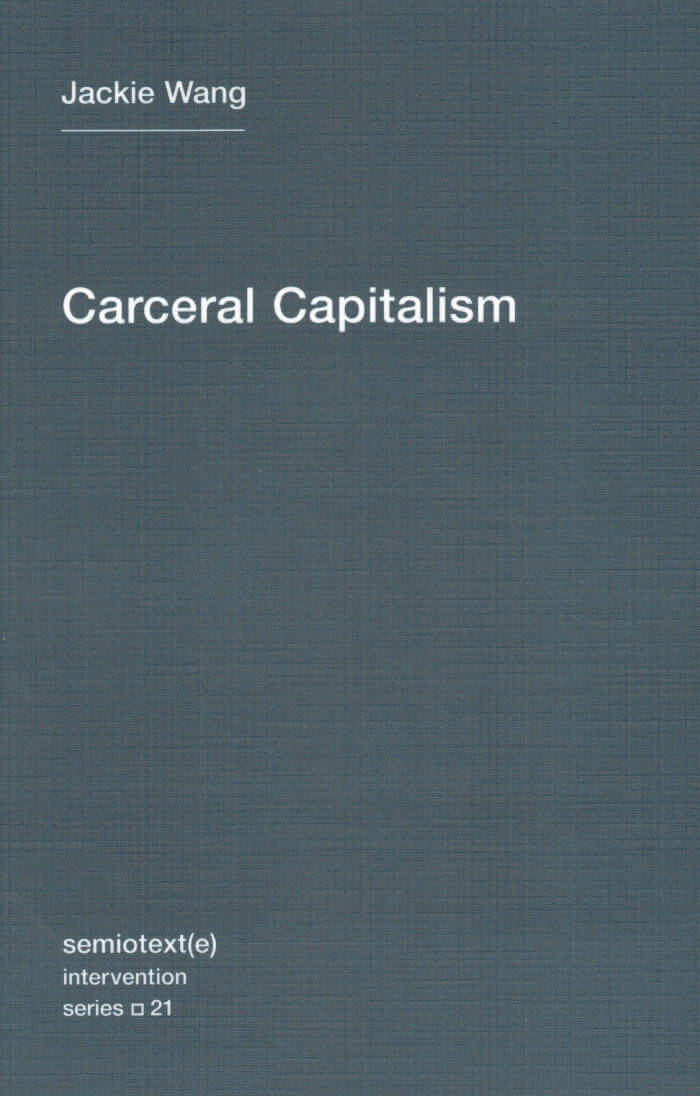
Carceral Capitalism
Essays on the contemporary continuum of incarceration: the biopolitics of juvenile delinquency, predatory policing, the political economy of fees and fines, and algorithmic policing.
What we see happening in Ferguson and other cities around the country is not the creation of livable spaces, but the creation of living hells. When people are trapped in a cycle of debt it also can affect their subjectivity and how they temporally inhabit the world by making it difficult for them to imagine and plan for the future. What psychic toll does this have on residents? How does it feel to be routinely dehumanized and exploited by the police?
In this collection of essays in Semiotext(e)'s Intervention series, Jackie Wang examines the contemporary incarceration techniques that have emerged since the 1990s. The essays illustrate various aspects of the carceral continuum, including the biopolitics of juvenile delinquency, predatory policing, the political economy of fees and fines, cybernetic governance, and algorithmic policing. Included in this volume is Wang's influential critique of liberal anti-racist politics, "Against Innocence," as well as essays on RoboCop, techno-policing, and the aesthetic problem of making invisible forms of power legible.
Wang shows that the new racial capitalism begins with parasitic governance and predatory lending that extends credit only to dispossess later. Predatory lending has a decidedly spatial character and exists in many forms, including subprime mortgage loans, student loans for sham for-profit colleges, car loans, rent-to-own scams, payday loans, and bail bond loans. Parasitic governance, Wang argues, operates through five primary techniques: financial states of exception, automation, extraction and looting, confinement, and gratuitous violence. While these techniques of governance often involve physical confinement and the state-sanctioned execution of black Americans, new carceral modes have blurred the distinction between the inside and outside of prison. As technologies of control are perfected, carcerality tends to bleed into society.
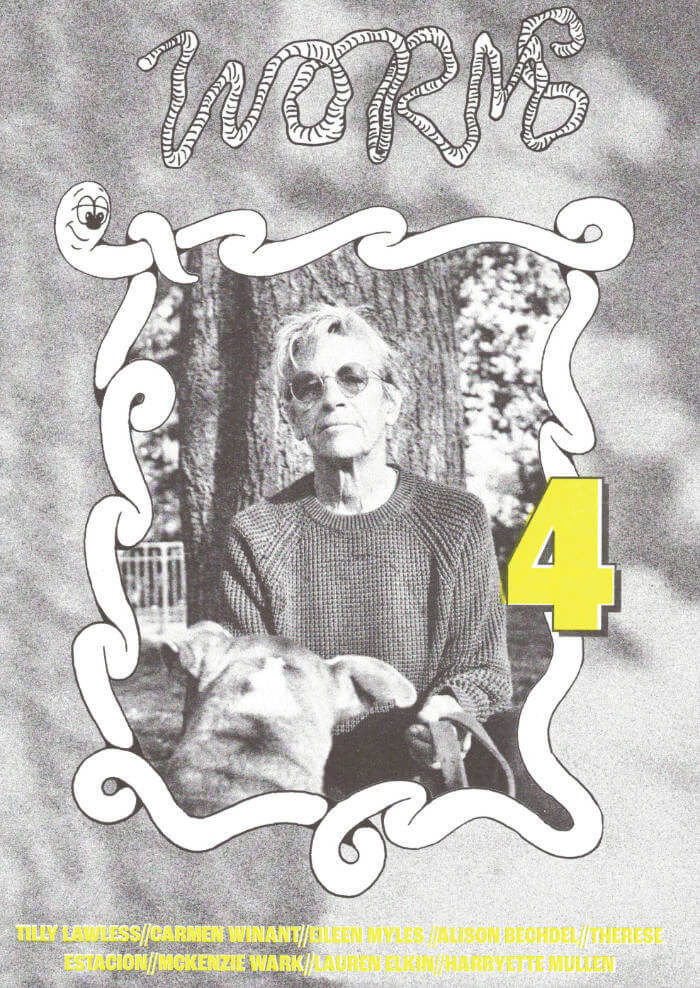
Worms #4 'The Flaneuse'
Worms #4 looks at psychogeography and the Situationists from a non-male perspective. Taking flâneuserie and the creative benefits of a good walk as its starting point, the issue features conversations with Eileen Myles, Alison Bechdel, Lauren Elkin, Tilly Lawless, Mckenzie Wark, Therese Estacion and Carmen Winant. 2021 was a fraught year for walking; the pandemic restricted our right to movement, while the murders of women walking in London led us to ask the question: how can the act of walking the streets spark political conversation?
Also included with this issue is an affirmation booklet in collaboration with @somuchluvindisclub
Worms is a biannual literary style magazine that celebrates female and non-binary writer culture.
‘If you’re reading this, you are a worm. We’re all worms, and in the end, we’re going to be eaten by them. As a (book)worm, you will fertilize your mind with glorious words…’
Founded in 2019 by Clem Macleod during her degree at Central Saint Martins, Worms began with a mad, spiralling obsession with the late Kathy Acker.
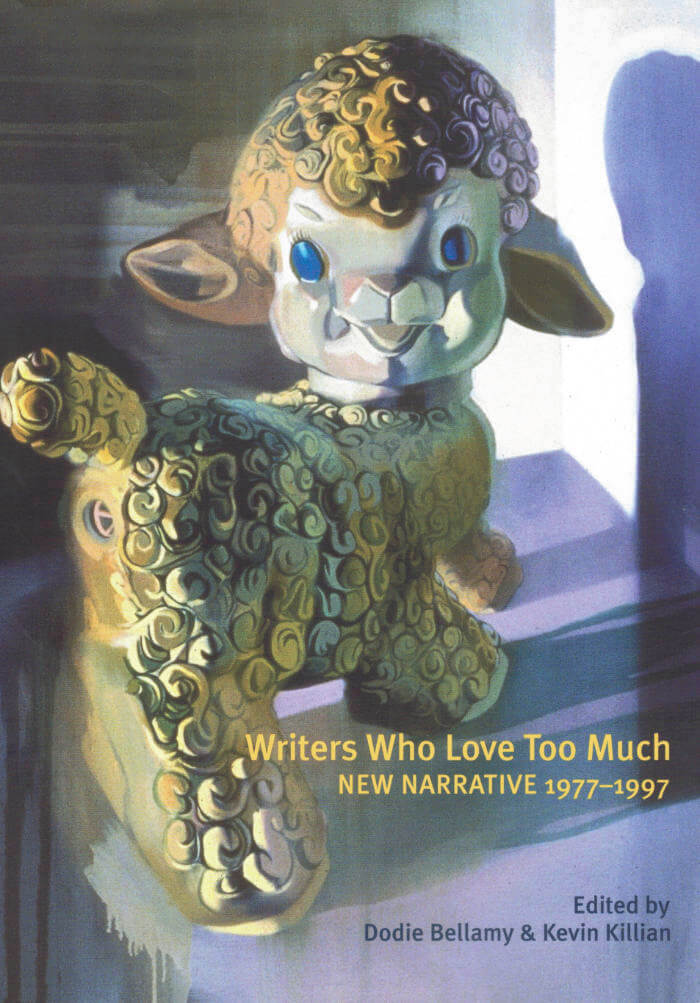
Writers Who Love Too Much: New Narrative 1977-1997
This long overdue anthology of New Narrative includes both classic New Narrative texts and rare supplementary materials, allowing the movement fueled by punk, pop, porn, French theory, and social struggle to bound back to life, ripe with dramatic propulsion, to form a new map of late 20th century creative rebellion.
"Gossipy and uninhibited, its breath is hot in your ear. It wants to tell you everything, and it wants you to overshare back." — M. Milks
"One of New Narrative's all-time best jokes is about the movement itself. It's the parodic motto that Bellamy formulates in Academonia for New Narrative "at its worst" "I have sex and I'm smarter than you." But "sex without fantasy," Camille Roy posits, "is nothing." The pieces compiled in Writers Who Love Too Much don't restrict fantasy. They use, as Boone says, eros, rather than facts, as the matter of narrative. Sex and fantasy are for New Narrative the stuff of ordinary life." — Jean-Thomas Trembla
Contributors include: Steve Abbott, Kathy Acker, Michael Amnasan, Roberto Bedoya, Dodie Bellamy, Bruce Benderson, Charles Bernstein, Nayland Blake, Bruce Boone, Lawrence Braithwaite, Rebecca Brown, Kathe Burkhart, Marsha Campbell, Dennis Cooper, Sam D'Allesandro, Gabrielle Daniels, Leslie Dick, Cecilia Dougherty, Bob Flanagan, Robert Glück, Judy Grahn, Brad Gooch, Carla Harryman, Richard Hawkins, Ishmael Houston-Jones, Gary Indiana, Edith A. Jenkins, Kevin Killian, Chris Kraus, R. Zamora Linmark, Eileen Myles, John Norton, F.S. Rosa, Camille Roy, Sarah Schulman, Gail Scott, David O. Steinberg, Lynne Tillman, Matias Viegener, Scott Watson, Laurie Weeks.

On the Self-Reflexive Page II
Originally published in 2010, ‘On the Self-Reflexive Page’ is part artist’s book and part essay, part literary excavation and part typographical miscellany. For this second incarnation of Louis Lüthi’s anthology of thematically arranged pages, the original material has been significantly expanded and revised. Like its predecessor, the new version proposes a typology of nonverbal elements found in novels, short stories, and essays. In each of the pages reproduced here, the prose is interrupted by one of these nonverbal elements, from black or blank pages, drawings or collages, photographs or film stills, to fragments of text or visual poems that are distinct from a conventional page layout.

Transgender Warriors: Making History from Joan of Arc to Marsha P. Johnson and Beyond
This groundbreaking book, far ahead of its time when first published in 1996 and still galvanizing today, interweaves history, memoir, and gender studies to show that transgender people, far from being a modern phenomenon, have always existed and have exerted their influence throughout history. Leslie Feinberg, hirself a lifelong transgender revolutionary, reveals the origin of the check-one-box-only gender system and shows how zie found empowerment in the lives of transgender warriors around the world, from the Two Spirits of the Americas to the many genders of India, from the trans shamans of East Asia to the gender-bending Queen Nzinga of Angola, from Joan of Arc to Marsha P. Johnson and beyond.

Toward The Not-Yet: Art As Public Practice
Jeanne Van Heeswijk, Maria Hlavajova and 1 more
This volume from BAK, basis voor actuele kunst, combines handbook, dictionary, and anthology to investigate artistic practice aimed at achieving social change. With text and visual essays, definitions, exercises, interviews, and images, the contributors envision a praxis that is committed to experimenting with aesthetics and politics in ways that go beyond the conventions of Western modernity. These are practices that are interdisciplinary, theoretically informed, and politically driven, offering ways of being together otherwise. Catalyzed by the work of artist Jeanne van Heeswijk, which focuses on radicalizing civic processes, Toward the Not-Yet imagines and enacts alternative ways of conceiving the present and future.
Contributors, among them notable artists, scholars, activists, and writers consider ways of participating in civic life, including dreamscaping and radical listening; the creation of safer spaces for humans and nonhumans; ways of radically shifting laws and policies; and tactics and methods of collective sanctuary. Toward the Not-Yet is part of BAK's series of BASICS readers, debuting a SUPERBASICS variation that is larger, with more visual content.

Reading / Feeling
Frédérique Bergholtz, Tanja Baudoin
Reading / Feeling examines affect, a term that delineates a field where the personal and political meet in sensory movements between bodies. A pre-emotional experience, affect constitutes the social and economic relationships that make up the fabric of society. Reading / Feeling considers the meaning of affect in theory and artistic practice through texts by theoreticians, artists, and curators read in If I Can’t Dance’s Reading Groups in Amsterdam, Toronto, and Sheffield as part of the programme for Edition IV – Affect (2010–12). It also includes three new essays, short statements by Reading Group members, and artist pages.
Contributors: Sara Ahmed, Rhea Anastas, Lauren Berlant, Leo Bersani, Lone Bertelsen, Gregg Bordowitz, Judith Butler, Jeremiah Day, Gilles Deleuze, Lucien Febvre, Simone Forti, Adam Frank, Andrea Fraser, Félix Guattari, Michael Hardt, Sharon Hayes, Brian Holmes, Jutta Koether, Glenn Ligon, Brian Massumi & Mary Zournazi, Helen Molesworth, Andrew Murphie, Sina Najafi & David Serlin, George Orwell, Emily Roysdon, Eve Kosofsky Sedgwick, Baruch Spinoza, Susan Sontag, Jan Verwoert; it also includes: essays by Tanja Baudoin, Emma Cocker, Jacob Korczynski; contributions by Reading Group members Stephen Bowler, Alison J Carr, Belen Cerezo, Jon Davies, Anik Fournier, Victoria Gray, Linda Kemp, Wjm Kok, Janice McNab, Gabrielle Moser, Cecilia Paldino, Andrew James Patterson, Hester Reeve, Julie Swalloa, cheyanne turions, Vivian Ziherl; and artist pages by Matthew Lutz-Kinoy.
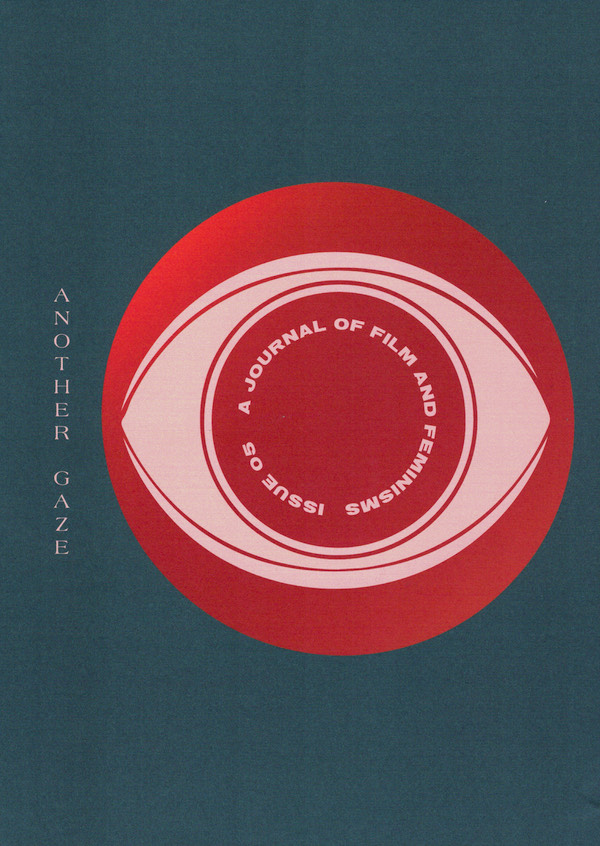
Another Gaze Journal 05
Missouri Williams, Daniella Shreir
Including writing about Theresa Hak Kyung Cha, Linda Manz, Sadie Benning, Sarah Maldoror, Cecilia Mangini, Agnes Martin, Peggy Ahwesh, Kira Muratova, Alina Szapocznikow, Jean Genet and more…
On subjects including an interrogation on cinephilia and gender, surveillance, infant observation during the pandemic and the screen as psychic portal, Beirut on film, devotional labour, prisons during lockdown, the notion of solidarity, reproduction and futurity, and much more... Roundtables about Sarah Maldoror; hands and fate, work, pleasure, touch, and surveillance; early women's travel films…
Plus, the year in review…
Featuring writing and contributions by María Palacios Cruz, Lizzie Borden, Kathryn Scanlan, Yasmina Price, Nicolas Russell, Rebecca Liu, Georgie Carr, Pooja Rangan, Jonathan Rosenbaum, Nuotama Bodomo, Phoebe Campion, Janaina Olivera, Cassie da Costa, Frank Beauvais, AS Hamrah, Awa Konaté and many more…

Mix & Stir
Kitty Zijlmans, Helen Westgeest
Mix & Stir, this book’s aim is an endeavour to understand art as being a panhuman phenomenon of all times and cultures; to steer away from the persistent Eurocentric/Western-centric viewpoint towards a transcultural and transnational interconnected model of exchange and processes of interculturalization. Mix & Stir wants to expand this landscape by bringing to the fore new, recalcitrant, queer, idiosyncratic practices and discourses, theories and topics, methods and concerns that open up ways to approach art from a global perspective.
Analogous to a cookery book filled with recipes and instruction, Mix & Stir explores new outlooks on contemporary art from global perspectives. It intends to encourage studying art beyond national constraints, cultural dominances, and hierarchies: a voyage similar to that of culinary discovery. The book brings a variety of tastes and flavours to the table, and breaks new ground by allowing innovative, contrary, queer, idiosyncratic practices and discourses, theories and topics, methods, and concerns to access art in its global dimensions.
Contributions: Thomas J. Berghuis, Elisabeth de Bièvre, John Clark, Thomas DaCosta Kaufmann, Parisa Damandan, Wilfried van Damme, Sophie Ernst, Angèle Etoundi Essamba. Paul Faber, Claire Farago, Anne Gerritsen, Jacqueline Hoàng Nguyễn, Isabel Hoving, Stijn Huijts, Joo Yun Lee, Nancy Jouwe, Remy Jungerman, Sonja van Kerkhoff, Meta Knol, Frans-Willem Korsten, Katja Kwastek, Sybille Lammes, Charl Landvreugd, Gregor Langfeld, Chris Lee, Christa-Maria Lerm Hayes, Virginia MacKenny, Sarat Maharaj, Tirzo Martha, Kyveli Mavrokordopoulou, Larissa Mendoza Straffon, Ni Haifeng, Stéphanie Noach, Anja Novak, John Onians, Rob Perrée, Georges Petitjean, Rosalien van der Poel, Jennifer Pranolo, Lize van Robbroeck, Pippa Skotnes, Henk Slager, Rudi Struik, Eva-Maria Troelenberg, Leonor Veiga, Leon Wainwright, James Webb, Janneke Wesseling, Helen Westgeest, Carine Zaayman, Kitty Zijlmans, Robert Zwijnenberg.
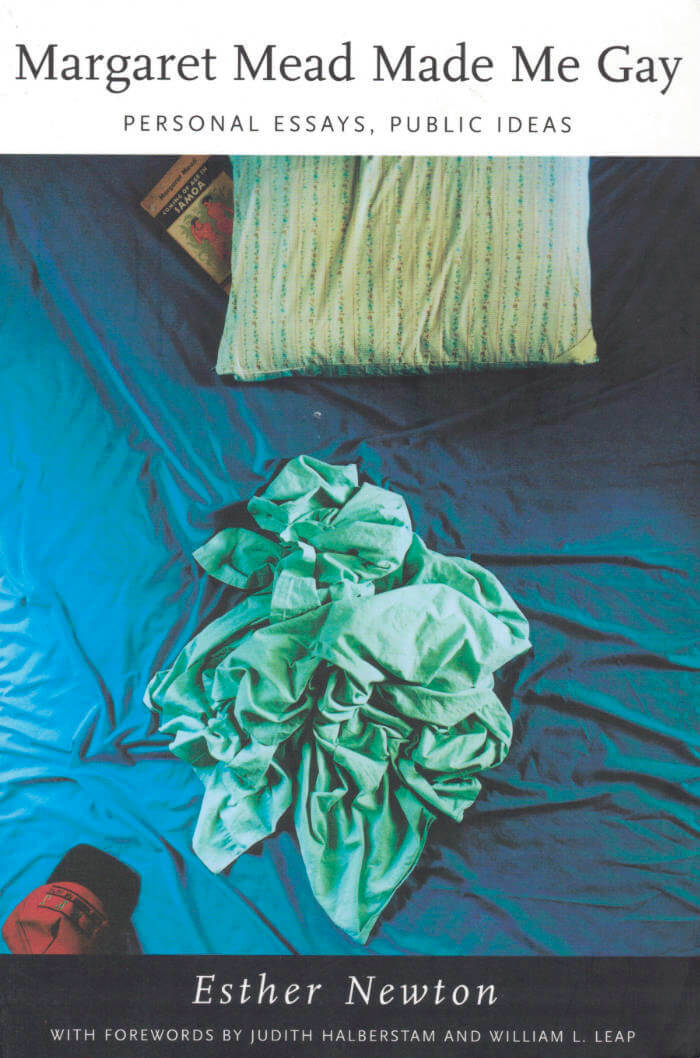
Margaret Mead Made Me Gay: Personal Essays, Public Ideas
Margaret Mead Made Me Gay is the intellectual autobiography of cultural anthropologist Esther Newton, a pioneer in gay and lesbian studies. Chronicling the development of her ideas from the excitement of early feminism in the 1960s to friendly critiques of queer theory in the 1990s, this collection covers a range of topics such as why we need more precise sexual vocabularies, why there have been fewer women doing drag than men, and how academia can make itself more hospitable to queers. It brings together such classics as “The Mythic Mannish Lesbian” and “Dick(less) Tracy and the Homecoming Queen” with entirely new work such as “Theater: Gay Anti-Church.”
Newton’s provocative essays detail a queer academic career while offering a behind-the-scenes view of academic homophobia. In four sections that correspond to major periods and interests in her life—”Drag and Camp,” “Lesbian-Feminism,” “Butch,” and “Queer Anthropology”—the volume reflects her successful struggle to create a body of work that uses cultural anthropology to better understand gender oppression, early feminism, theatricality and performance, and the sexual and erotic dimensions of fieldwork. Combining personal, theoretical, and ethnographic perspectives, Margaret Mead Made Me Gay also includes photographs from Newton’s personal and professional life.
With wise and revealing discussions of the complex relations between experience and philosophy, the personal and the political, and identities and practices, Margaret Mead Made Me Gay is important for anyone interested in the birth and growth of gay and lesbian studies.

A Poetics of the Press: Interviews with Poets, Printers, & Publishers
The publication of Donald Allen's The New American Poetry in 1960, as well as the Vancouver and Berkeley poetry conferences, sparked a poetic renaissance. It was an era rich in exploration and innovation that articulated a new relationship between form and content. Simultaneously, American artists began working with the book as a creative medium that rivaled the European tradition of the early twentieth century.
This book is the first collection of interviews with some of the pioneers working at the intersection of the artists book and experimental writing that continues to this day.
Includes interviews with Keith & Rosmaie Waldrop, Tom Raworth, Lyn Hejinian, Alan Loney, Mary Laird, Jonathan Greene, Alastair Johnston, Johanna Drucker, Phil Gallo, Steve Clay, Charles Alexander, Annabel Lee, Inge Bruggeman, Matvei Yankelevich, Anna Moschovakis, Aaron Cohick, and Scott Pierce. Co-published with Cuneiform Press.

Pasts, Futures, and Aftermaths: Revisiting the Black Dada Reader
The sequel to Pendleton's acclaimed Black Dada Reader, compiling an anti-canon of radical experimentation and thought.
In 2011, artist Adam Pendleton (born 1984) assembled Black Dada Reader, a compendium of texts, documents and positions that elucidated a practice and ethos of Black Dada. Resembling a school course reader, the book was a spiral-bound series of photocopies and collages, originally intended only for personal reference, and eventually distributed informally to friends and colleagues. The contents - an unlikely mix of Hugo Ball, W.E.B. Du Bois, Adrian Piper, Gertrude Stein, Sun Ra, Stokely Carmichael, Gilles Deleuze -formed a kind of experimental canon, realized through what Pendleton calls radical juxtaposition. In 2017, Koenig Books published the Reader in a hardcover edition, with newly commissioned essays and additional writings by the artist. A decade later, Pendleton has composed another reader, building upon the constellation of writers, artists, filmmakers, philosophers and critics that emerged in the first volume.
Source texts by Sara Ahmed, Mikhail Bakhtin, Toni Cade Bambara, Amiri Baraka, Augusto de Campos, Hardoldo de Campos, and Décio Pignatari, Angela Davis, Gilles Deleuze, Julius Eastman, Adrienne Edwards, Clarice Lispector, Achille Mbembe, Philippe-Alain Michaud, Charles Mingus, Piet Mondrian, Leslie Scalapino, Leonard Schwartz and Michael Hardt, Juliana Spahr, Cecil Taylor and Malcolm X.
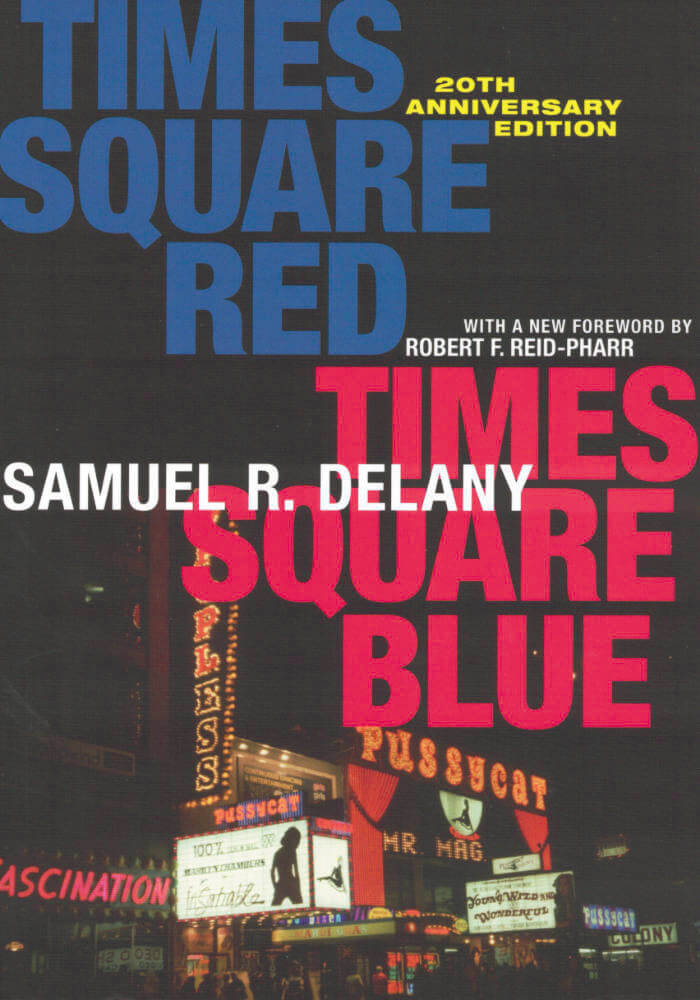
Times Square Red, Times Square Blue
Times Square Red, Times Square Blue is a non-fiction book written by science fiction author Samuel R. Delany and published in 1999 by the New York University Press.
The book is a compilation of two separate essays: Times Square Blue and ...Three, Two, One, Contact: Times Square Red.
This 20th Anniversary Edition contains an introduction by Robert Reid-Pharr.
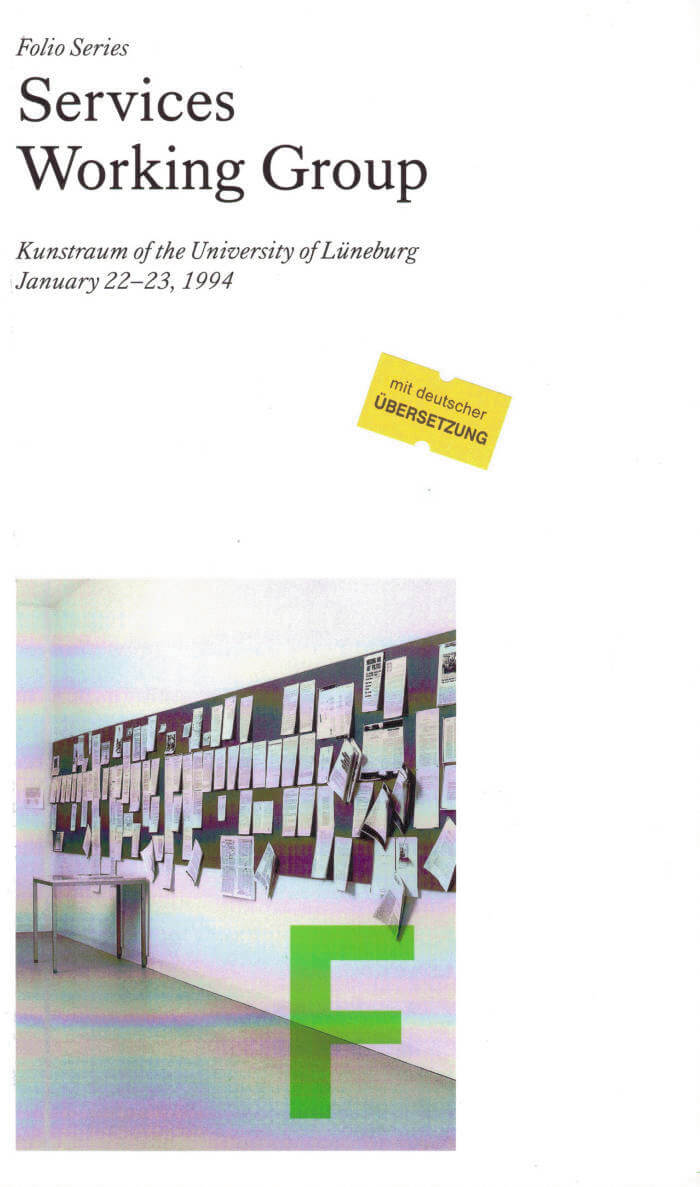
Services Working Group
Folio F presents complete transcripts from the ground-breaking working group on labour relations and institutional governance in the arts organized in 1994 by Helmut Draxler and Andrea Fraser at the Kunstraum of the University of Lüneburg.
Held on January 22 and 23, 1994, the candid discussions between the organizers, Kunstraum representatives, and invited practitioners were video-recorded. Newly-produced transcripts of this compelling recording are presented here in English and German, documenting the entirety of the debut Services Working Group discussions. These transcripts are supplemented by newly-digitized photograph documentation of the conversations and a newly-commissioned post-script text by Draxler and Fraser that reexamines Services in light of current discussions around the socioeconomic conditions of art and its institutions.
Contributions by:
Judith Barry
Ute Meta Bauer
Jochen Becker
Ulrich Bischoff
Beatrice von Bismarck
Iwona Blazwick
Susan Cahan
Michael Clegg
Stephan Dillemuth
Helmut Draxler
Andrea Fraser
Renée Green
Martin Guttmann
Renate Lorenz
Christian Philipp Müller
Fritz Rahmann
Eric Golo Stone
Fred Wilson
Ulf Wuggenig

Some Styles of Masculinity
An intimate, urgent and riotous account of masculinity, whiteness, queerness and belief in America.
In winter 2018, Gregg Bordowitz performed a three-part lecture series at the New Museum as part of Trigger: Gender as a Tool and a Weapon. Each evening, he explored an avatar of masculinity that was formative to him as he came of age as an outer-borough child of Jewish immigrants, then as an artist-activist in Manhattan at the dawn of the AIDS crisis: the rock star, the rabbi and the comedian. He merged personal and political history, ribald humor and social criticism, performer and persona.
Some Styles of Masculinity is a self-portrait and an essay on upheaval and plague, based on transcripts of the eponymous series, which Bordowitz has reimagined for the page. He asserts that gender can't be separated from ethnicity, sexuality, class or nationality, and he connects these aspects of himself through personal anecdotes as well as reflections on whiteness, diaspora, comedy and Jewish mysticism. Some Styles of Masculinity evokes David Antin's "talk poems," Maggie Nelson's "autotheory," David France's How to Survive a Plague and Wayne Koestenbaum's casually erudite criticism. This book is a winding, intimate, urgent, freewheeling account of thinking and enduring in difficult times.
Gregg Bordowitz (born 1964) is the author of Glenn Ligon: Untitled (I Am a Man) (2018), General Idea: Imagevirus (Afterall Books, 2010) and The AIDS Crisis Is Ridiculous and Other Writings, 1986-2003 (2004). He was an early participant in ACT UP (AIDS Coalition to Unleash Power), where he cofounded several video collectives.
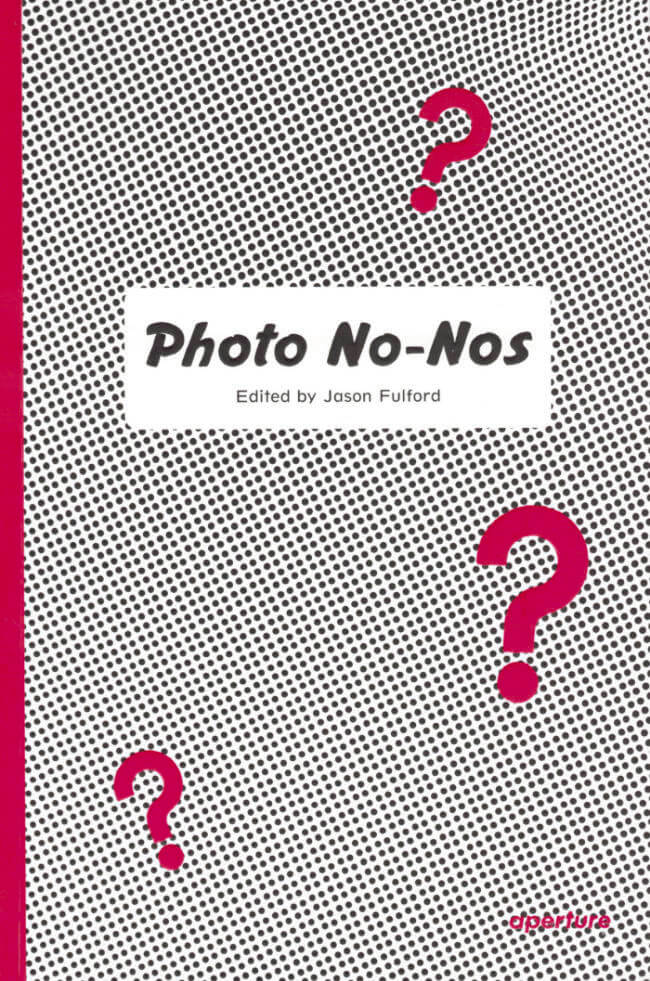
Photo No-Nos: Meditations on What Not to Photograph
At turns humorous and absurd, heartfelt and searching, Photo No-Nos is for photographers of all levels wishing to avoid easy metaphors and to sharpen their visual communication skills.
Photographers often have unwritten lists of subjects they tell themselves not to shoot—things that are cliché, exploitative, derivative, sometimes even arbitrary. Photo No-Nos features ideas, stories, and anecdotes from many of the world's most talented photographers and photography professionals, along with an encyclopedic list of more than a thousand taboo subjects compiled from and with pictures by contributors.
Not a strict guide, but a series of meditations on "bad" pictures, Photo No-Nos covers a wide range of topics, from sunsets and roses to issues of colonialism, stereotypes, and social responsibility. At a time when societies are reckoning with what and how to communicate through media and who has the right to do so, this book is a timely and thoughtful resource on what photographers consider to be off-limits, and how they have contended with their own self-imposed rules without being paralyzed by them.

Bee Reaved
A collection of essays from Dodie Bellamy on disenfranchisement, vulgarity, American working class life, aesthetic values, and profound embarrassment.
So. Much. Information. When does one expand? Cut back? Stop researching? When is enough enough? Like Colette's aging courtesan Lea in the Chéri books, I straddle two centuries that are drifting further and further apart.—Dodie Bellamy, “Hoarding as Ecriture”
This new collection of essays, selected by Dodie Bellamy after the death of Kevin Killian, her companion and husband of thirty-three years, circles around loss and abandonment large and small. Bellamy's highly focused selection comprises pieces written over three decades, in which the themes consistent within her work emerge with new force and clarity: disenfranchisement, vulgarity, American working class life, aesthetic values, profound embarrassment. Bellamy writes with shocking, and often hilarious, candor about the experience of turning her literary archive over to the Beinecke Rare Book & Manuscript Library at Yale and about being targeted by an enraged online anti-capitalist stalker. Just as she did in her previous essay collection, When the Sick Rule the World, Bellamy examines aspects of contemporary life with deep intelligence, intimacy, ambivalence, and calm.

Romance Utopia
Romance Utopia is a research project is both a digital archive, a radioshow, a videowork and a collection of essays around notions of romance.
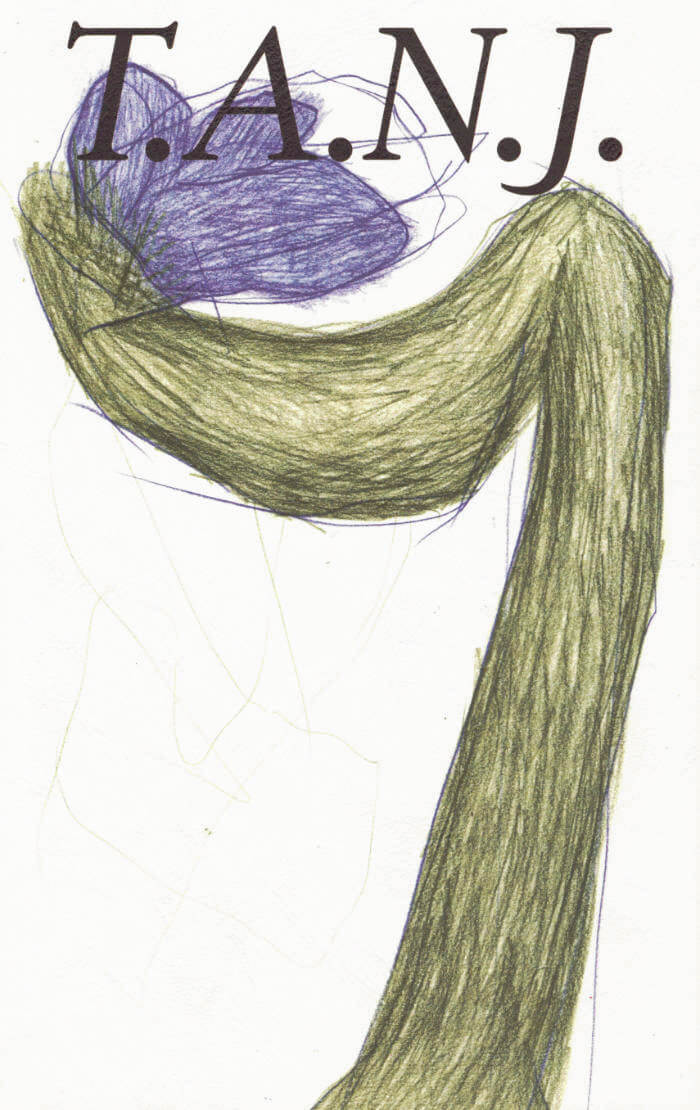
The Against Nature Journal #3
Aimar Arriola, Grégory Castéra
This third issue reviews the many ways in which medicine has pathologized non-procreative sexual desire— those bodies that challenge gender binaries or expose different abilities—while imagining other ways of collectively well-being.
"The issue opens with a commissioned work by visual artists CANDICE LIN and P. STAFF that evokes the central concerns of the journal in subtle and unexpected ways. Lambda Literary Award–winner INDRAPRAMIT DAS speculates on other forms of kinship in a new science-fiction story, while a transnational questionnaire offers insights into the continuous fight for reproductive justice.
We republish a chapter from the autobiography of the late South African, trans, traditional healer NKUNZI ZANDILE NKABINDE, which is introduced by RUTH MORGAN.
We continue to honor the power of poetry with works by ROSA CHÁVEZ and STELLA NYANZI, while celebrating the energy of collective action with a piece by WHAT WOULD AN HIV DOULA DO? In anticipation to his new book on queer desire in the Caribbean, scholar ANDIL GOSINE shares a previous article addressing the notion of “against nature,” while our Columns section brings news from Brazil, India, Kenya, Lebanon, Malaysia, Morocco, and the UK during a season of pandemic fatigue, but also care work, organization, and hope." — the editors
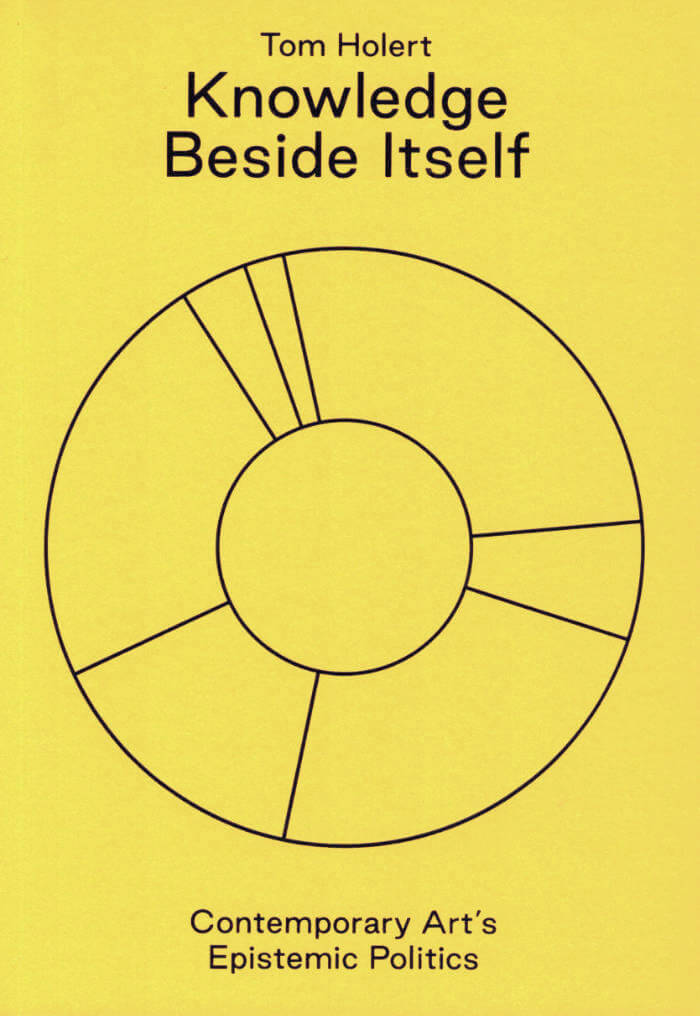
Knowledge Beside Itself – Contemporary Art's Epistemic Politics
A study on the role of research and knowledge production in today's contemporary art, and the growing relevance of art as conduit of knowledge.
What is the role and function of contemporary art in economic and politicalsystems that increasingly manage data and affect? Knowledge Beside Itself delves into the peculiar emphasis placed in recent years, curatorially and institutionally, on notions such as “research” and “knowledge production.” Considered as a specific, expansive mode of the culture industry, contemporary art is viewed here as a strategic bet on the social distinctions and value extractions made possible by claiming a different, novel access to “knowledge.” Contemporary art's various liaisons with the humanities and the social and natural sciences, as well as its practitioners' frequent embeddedness within transdisciplinary research environments and educational settings, have created a sense of epistemo-aesthetic departure, which concurs with the growing relevance of art as conduit or catalyst of knowledge.
Discussing the practice of artists such as Christine Borland, Tony Chakar, Natascha Sadr Haghighian, Adelita Husni-Bey, Jakob Jakobsen, Claire Pentecost, and Pilvi Takala, writer and curator Tom Holert submits the gambit of conceptualizing contemporary art as an agent of epistemic politics to a genealogical analysis of its political-economic underpinnings in these times of cognitive capitalism, machine learning, and a renewed urgency of epistemological disobedience.
Tom Holert is a writer and curator. In 2015 he cofounded the Harun Farocki Institut in Berlin, a platform for research and production departing from the example set by Farocki. With Anselm Franke he curated the 2018 exhibition “Neolithic Childhood: Art in a False Present, c. 1930” at Haus der Kulturen der Welt, Berlin.
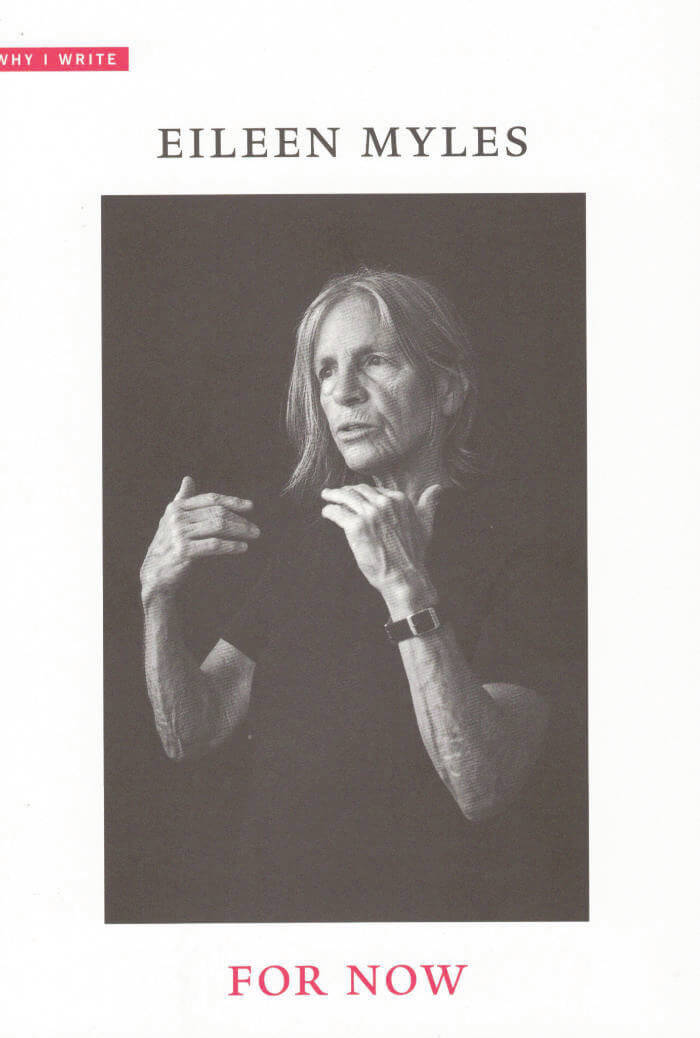
For Now (paperback)
In this third Why I Write volume, Eileen Myles addresses the social, political, and aesthetic conditions that shape their work.
In this raucous meditation, Eileen Myles offers an intimate glimpse into creativity's immediacy. With erudition and wit, Myles recounts their early years as an awakening writer; existential struggles with landlords; storied moments with neighbors, friends, and lovers; and the textures and identities of cities and the country that reveal the nature of writing as presence in time.
For Myles, time's "optic quality" is what enables writing in the first place, as attention, as devotion, as excess. It is this chronologized vision that enables the writer to love the world as it presently is, lending love a linguistic permanence amid social and political systems that threaten to eradicate it. Irreverent, generous, and always insightful, For Now is a candid record of the creative process from one of our most beloved artists.
Paperback edition - 2021.
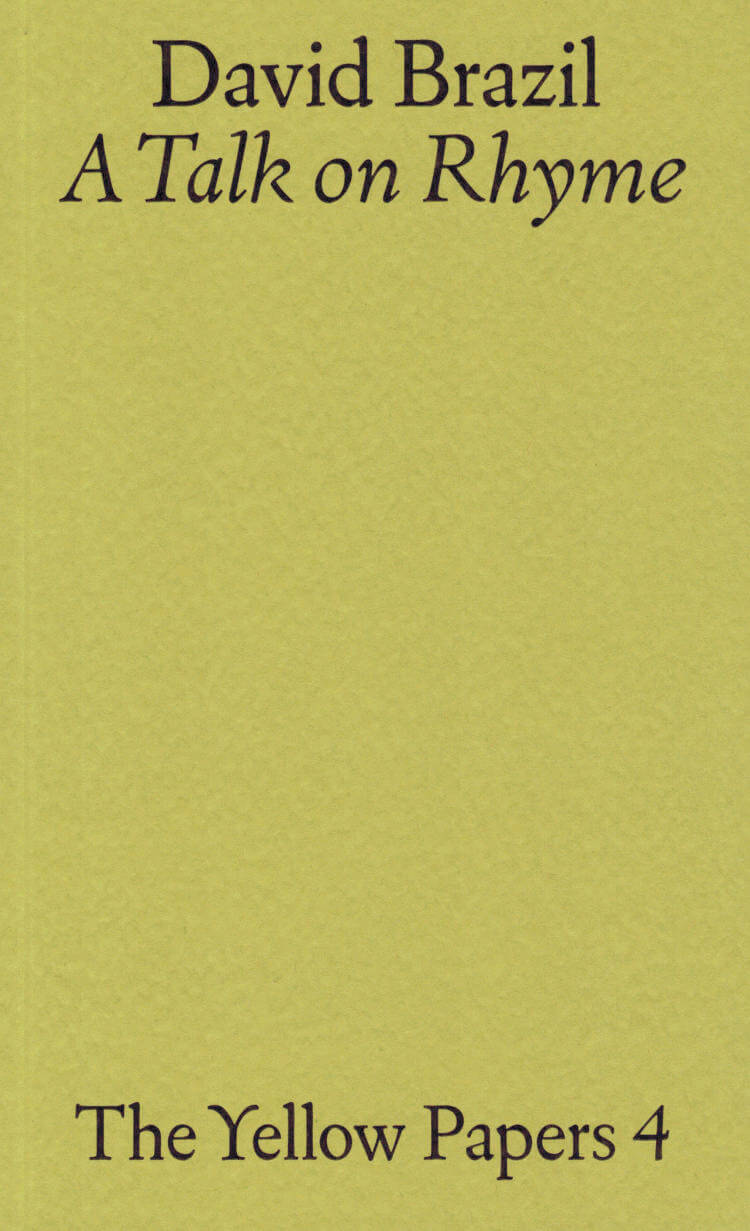
A Talk on Rhyme
In A Talk on Rhyme, a text distilled from a lecture given in 2014, poet David Brazil reflects on rhyme’s “emergence, progress, inoperativity, and prospect.” The Talk is supplemented by an essayistic bibliography on subjects ranging from classical prosody to American folk music, via writings on and by poets long dead whose names are obvious: Saint Paul, Dickinson, Herbert, Spicer, Hölderlin, Dante, O’Hara.
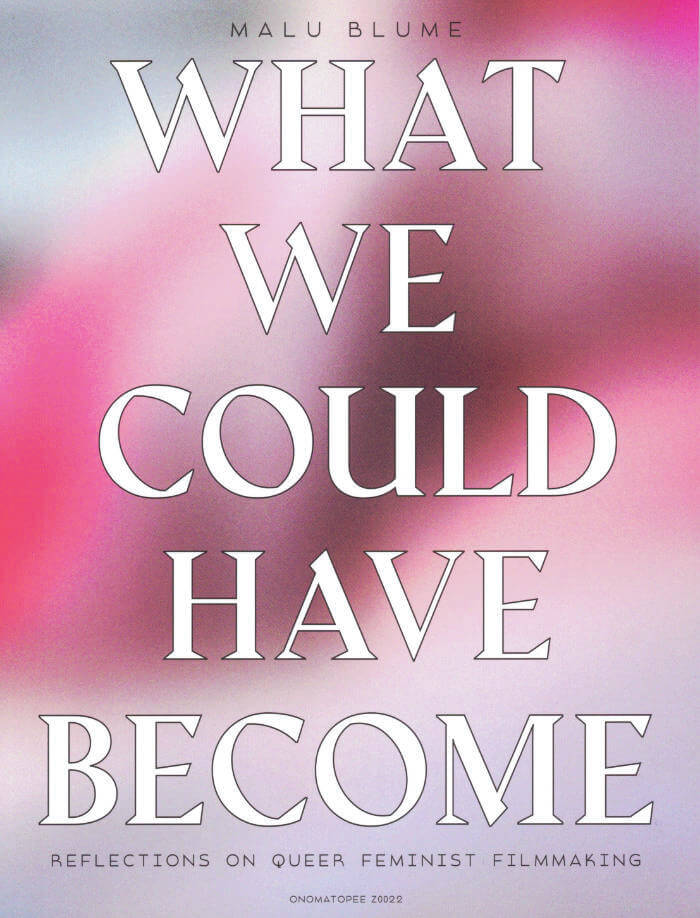
What We Could Have Become
The publication 'What we could have become: Reflections on queer feminist filmmaking' explores the radical potentials of care and speculative fiction in the context of queer feminist collective filmmaking. Departing from the experimental short film The Book of S of I (2020) by Malu Blume, this publication is a documentation of the film project just as much as its own artistic medium. Using a performative mode, it weaves together film stills with unreleased set photography, creating a visual narration that reflects caring and kinship through a queer feminist – and femme – lens.
With a foreword by editor Sascia Bailer, the booklet contains a transcript of the film’s narrative voice over and an essay on queer utopian care in the context of The Book of S of I and its making, both written by the artist Malu Blume. The publication concludes with a conversation between Malu Blume and their co-producers, friends and artistic collaborators Ipek Hamzaoglu, Laura Nitsch and Sophie Utikal, moderated by Sascia Bailer. In this conversation the artists and discuss the chances and challenges of collective film making in the context of producing The Book of S of I.
Malu Blume is a Berlin-based artist who works at the intersections of art, performance, film and education. In 2016 they completed a master's degree in Critical Studies at the Academy of Fine Arts Vienna. Malu Blume has been the co-founder and member of several collective projects on queer feminism, archival politics, friendship and collaborative knowledge production.
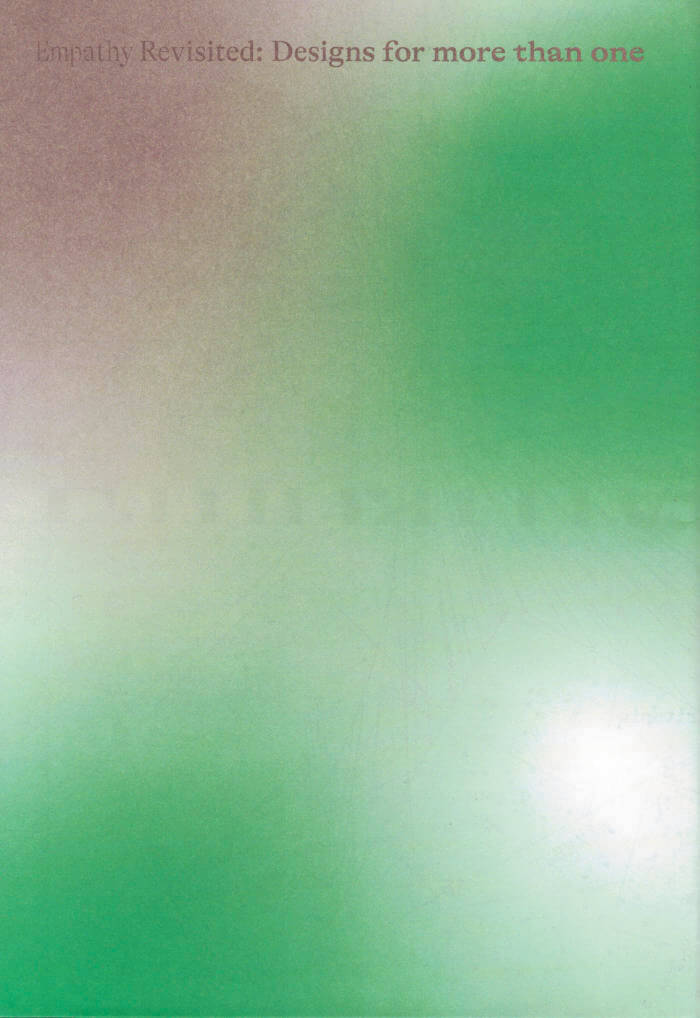
Empathy Revisited: Designs for more than one
Ideas, utopian propositions and practical solutions for reinterpreting and reconnecting empathically with the world around us.
This book brings together ideas and projects that seek to define a new role for design based on empathy.
As a mediator of emotions and feelings, design is presented here as a practice that takes care as its main purpose. Designers adopt sensitive, diplomatic, sometimes therapeutic functions, with the aim of connecting us with one another but also with the world around us, with other species, with soil, water and even the universe. In this book, the reader will find new ideas, utopian propositions but also practical solutions for reinterpreting and reconnecting with the world around them. Taking food as a key medium of encounter, both between people and also with the more than human world, the designers featured in this book consciously operate in a multi-scalar realm – from the invisible microbial life that lives in our gut to the vast landscapes transformed by agricultural practices. Designs for more than one are those that take into consideration not just their immediate user or client but the many constituents inevitably impacted by any new object or action.
Edited by Mariana Pestana with Sumitra Upham and Billie Muraben.
With written contributions by Ekin Ozbicer, Mariana Pestana, Susan Lanzoni, Naz Şahin, Billie Muraben, Sumitra Upham, FRAUD, Luigi Coppola and Vivien Sansour and Pelin Tan, Aslıhan Demirtaş, Black Athena Collective, theOtherDada, TiriLab, Counterspace, Anna Puigjaner (MAIO) with Alina Abouelenin, Aslı Uludağ, Dele Adeyemo, Young Curators Group, Eylül Şenses, Ulya Soley, Nur Horsanalı, Studio Ossidiana, Orkan Telhan + elii, Ibiye Camp, Ben Thorp Brown, Paula Gaetano Adi, Meriem Bennani, Calum Bowden, Jawa El Khash, Emmy Bacharach, Alice dos Reis, Macedo Cannat, Future Anecdotes.